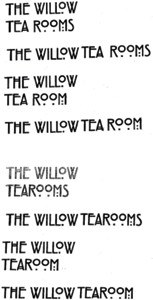A very British affair: The Willow Tea Rooms
A recent United Kingdom Intellectual Property Office (UKIPO) opposition decision has underlined the distinction between goodwill and reputation, and examined genuine use of a series mark.
Background
The opponent, Ms Mulhern, opened The Willow Tea Rooms in December 1983, at 217 Sauchiehall Street in Glasgow. The building was designed by the renowned architect Charles Rennie Mackintosh in 1903 together with Kate Cranston, who was famous for her tea rooms and ran "Miss Cranston's Tea Rooms" from the building. After Kate Cranston's retirement, the building changed ownership and was not used as a tea room again until Ms Mulhern opened The Willow Tea Rooms. Ms Mulhern's tea rooms have enjoyed great success and have become somewhat of a tourist attraction in Glasgow, featuring as the only Scottish tea rooms in the Sunday Times' "Top 20 Best Stops for Tea in the United Kingdom".
Ms Mulhern filed to register the below stylised series marks for WILLOW and THE WILLOW TEA ROOMS in 1991 and 2000 respectively (earlier marks):


In 2014, The Willow Tea Rooms Trust (the trust) acquired the building at 217 Sauchiehall Street with the objective of restoring the building to Charles Rennie Mackintosh's original design. The building was closed for works and Ms Mulhern moved her business. The trust subsequently applied to register the mark THE WILLOW TEA ROOMS for commercial, educational, cultural, and architectural services, and Ms Mulhern opposed the application on the basis of likelihood of confusion, the reputation of her earlier marks, and passing off. The trust denied these grounds and put Ms Mulhern to proof of use.
Goodwill
The trust claimed that the Sauchiehall building had been known as THE WILLOW TEA ROOMS since 1903, as Sauchiehall Street was named after the Gaelic for "Alley of the Willows". It claimed that the goodwill in the name THE WILLOW TEA ROOMS belonged to the building, and therefore, to the owners of the building, being the trust. On this point, the UKIPO found that, although a building can have a reputation, this is different to goodwill. Referring to established case law, the UKIPO stated that goodwill can only exist if there is commercial activity and cannot exist "in a vacuum". Further there was no evidence that the building had in fact been referred to as THE WILLOW TEA ROOMS prior to the opening of Ms Mulhern's tea rooms.
Use of series of trade marks
Ms Mulhern's earlier registration for THE WILLOW TEA ROOMS is a series of eight stylised marks and the trust challenged whether there is use of any or all of the stylised forms. The UKIPO considered the mark as used on goods and the extent to which this altered the distinctive character of the registered mark. It was found that the distinctive character of the registered mark is "overwhelmingly concentrated in the words", and that even if the mark was not used in its stylised forms, this would not alter its distinctive character. The trust also challenged whether there is use of the earlier series mark WILLOW. The UKIPO accepted that there is no use of the mark WILLOW by itself, but found that because the mark is registered for services which are encompassed by the series mark THE WILLOW TEA ROOMS, it did not need to decide the point.
Outcome
The opposition was successful in relation to approximately two-thirds of the application and Ms Mulhern was granted an award of costs.
In short
The decision is a useful reminder that goodwill is inseparable from the business to which it adds value. While reputation can exist without a supporting business, goodwill can generally only exist via business or trade.
Case details at a glance
Jurisdiction: England & Wales
Decision level: UKIPO
Parties: Anne Mulhern v The Willow Tea Rooms Trust
Date: 27 January 2017
Citation: O-032-17
Decision: http://dycip.com/thewillowtearooms